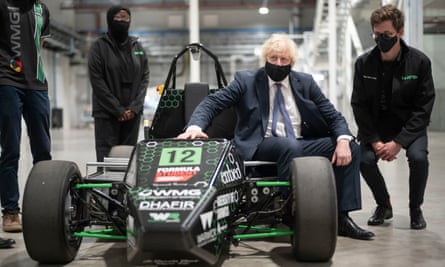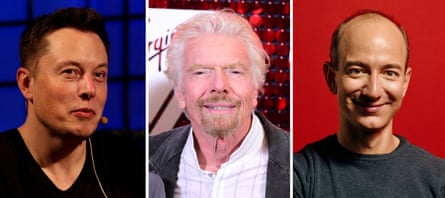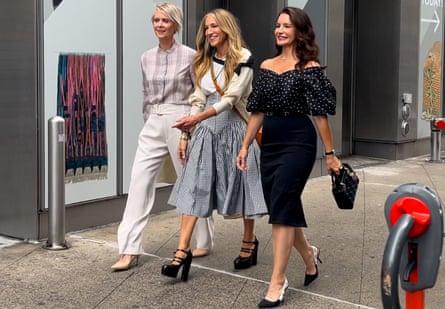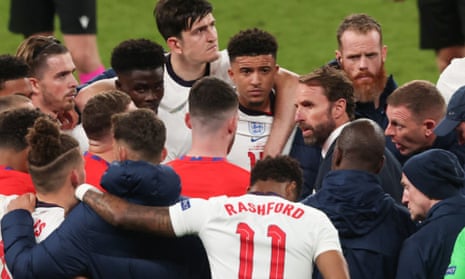Monday
The highs are lower, when you watch England play from abroad, on the other hand, the lows aren’t as crashingly bad. Efforts to interest New Yorkers in England’s championship defeat are mostly met with blank stares. “You know, the UEFA championship final,” I say, pleadingly, to an American friend. “What words are coming out of your mouth?” she says. It’s hard not to grow petulant. “The whole rest of the world understands.”
At least watching England’s defeat in a vacuum had a cushioning effect. Most of the sports bars in my neighbourhood closed for good during Covid, so on Sunday, an English friend had come round so we could watch the match at home. After making sure we landed on a channel without American commentary, we settled in. Neither of us knows much about football, an admission it costs me to make given that I ghost-wrote Megan Rapinoe’s memoir last year. (Much of the edit came down to her balking at my English soccer idioms. “We don’t say ‘booted’, we say ‘smashed’. We don’t say ‘match’ we say ‘game’.” Meanwhile, I never once felt comfortable around the word “cleats”.)
Oliver and I watched the game and provided the italicised commentary of the extremely fair-weather fan. “Kick the ball!” he said. “Put the ball in the goal!” I rejoindered. “Do some football!” Only so much pathetic distancing could reasonably be done, however, and in the final minutes, we were screaming and burying our heads in our hands. The next morning, there was zero external reflection of this profound moment in our lives as English people: a tiny headline in the New York Times and almost no mention of the match on the radio. It might have been the cheese-rolling championship of Outer Ruritania for all the Americans cared.

Tuesday
We cycle five blocks to where my kids go to camp. It’s a stretch of street that runs parallel to the Hudson River, and in certain places is subject to weird weather. There’s one particular corner where, with no warning, a vortex wind tunnel can take effect, sending powerful gusts down the canyon between blocks. You have to be careful.
Riding home in the afternoon, we see huge, purple clouds banked to the west. “Come on, let’s hurry,” I say, but there’s no hurrying. My kids creep along on their bikes with stabilisers, stalling at the summit of each curb, before slipping, agonisingly, back into the street. As we cross at the corner, a sudden gust of wind slams into us with such force, that one flies off her bike and is thrown down the hill, where to the surprise of everyone involved, she’s caught by a woman walking her dog.
The wind doesn’t abate. The other kid gets off her bike and is immediately pushed over. I hang on to her wrist while she blows down the hill, screaming, and behind us a woman with a double pushchair struggles to stay upright. A pane of glass blows out and shatters over the sidewalk. Somehow, we drag ourselves into the lobby of a nearby building and collapse in a heap, with a bunch of other refugees from the weather. That night, a thunderclap so loud it is heard by friends in every part of the city wakes us up at 3am. In the morning, it is all anyone can talk about; how it sounded like a bomb, not weather.
You wouldn’t put it in a movie, it’s so melodramatic, but there’s no question as to how all of this feels: like the starting gun on a run of events that ends in the Day After Tomorrow.
Wednesday
The kids’ summer camp is free, laid on and paid for by the city, as astonishing a development as any I’ve experienced in almost 15 years in New York – where nothing except the Staten Island ferry and occasional sketchy public wifi is free. If Covid has made a tiny bit of socialism occur, it’s gratifying to see its effect. Summer camp is so unbearably expensive in the city, the free one cuts across class lines. Everyone who can, from the projects to the swanky co-ops of Central Park West, is sending their kids to these camps, which are located across the city and are running from now until mid-August.
The only downer has been panicky, last minute job ads for camp counsellors that appeared on recruitment sites a few days before the start, some of which had a slight “no checks required!” air about them. Anyway, so far it has been great; well-organised, fun but not too fun, and with some killjoy catchup academics attached. It’s even a plus that none of the kids have left the air-conditioned school buildings so far; temperatures in Central Park hit 90 degrees (32C) daily and I find myself glad they’re doing mimsy indoors stuff – even if its exact nature is obscure. “What do you do all day?” I ask one of my kids, who gives me a superior look. “Activities,” she says, mysteriously, and declines all further questioning.
Thursday

After camp, we swing by the library, which has finally reopened for browsing. My kids take a book off the shelf entitled Elon Musk and the Quest for a Fantastic Future, which looks like something he has paid to have published himself. There he is on the cover in heroic, cartoon form, holding a pose a bit like Superman, or David Brent after a corporate speaking gig: arm extended, fist raised, punching the air in triumph.
The new space race is a tough one to pick sides on. If you had to choose between Musk, Bezos and Branson as the pioneer one might most hope space would hang on to, I’m not sure who I’d go with. Bezos, horrible to his workforce, and that sleeveless puffer he wears, on the other hand he did face down the National Enquirer over details of his affair. Branson: so many finely filigreed layers of creepiness, a man with the power to imbue any environment, no matter how grave, with the vibe of a 70s gameshow.
And Musk, in court this week in a case brought against Tesla by its shareholders, who disclosed to the judge he doesn’t like running the company. “I rather hate it and I would much prefer to spend my time on design and engineering,” he said fussily, in what I guess was a move to seem above the sordid business of making money. Would that he could share this noble spirit with other realms far, far away.
Friday
The French government has cannily boosted vaccination rates by announcing that French citizens can’t go into supermarkets, shops, trains or, most persuasively, cafes, if they haven’t had the jab or a recent negative test. After the announcement at the beginning of the week, more than 1 million people in France made vaccine appointments, the biggest uptake in the shortest period of time since French vaccination programmes began.
One wonders what the equivalent threat to unvaccinated English people would be. No pubs, obviously, but beyond that; unless you’re vaccinated, you can’t join a queue? Lick a stamp at the Post Office? Or – in a category I file vaguely under the heading “There’ll always be an England” – remove your mask in the street so that, while saying something ostensibly polite to someone you’d rather not have run into, you may clearly be seen muttering something rude as you part.


